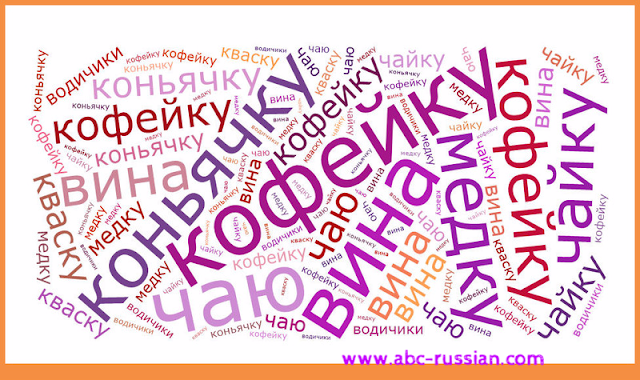
Хотите чай , чая or чаю?
When students start learning Russian one of the first verbs they meet - is the verb «хотеть» (to want) and that obvious because they need this verb and start using it from the very beginning expressing their wishes.
Russian language grammar: the Partitive Genitive case
According to the Russian grammar we teach them that after the verb «хотеть» the Accusative case (case N4) is used.
For example:
- Я хочу чай, вино, конфету, торт, мороженое и сметану.
But the problem is when somebody asks them:
- Вы хотите чаю, кофейку, вина, торта, мороженого или сметаны?
That's obvious that's not Accusative! It's Genitive! You can see that native speakers of Russian language usually use Genitive case (case N2) after this Russian verb.
WHY?
Why do Russian native speakers use Genitive case after the verb хотеть, while all the grammar books say that you should use Accusative?
WHY?
Why do Russian native speakers use Genitive case after the verb хотеть, while all the grammar books say that you should use Accusative?
The answer we can find in the history of Russian language.
Nowadays you are lucky that there are only six cases in Russian language. There were 11 cases before. 5 cases disappeared but not completely. We can find them in our speech.
There was the Partitive Genitive case in Russian language before. It used to denote an unspecified amount , or a part of something. And as a result this case we can still find in our speech.
The Partitive Genitive is widely used when speaking about drinks, food and it’s ingredients: (sugar, salt, milk, rice, tea, juice etc)
The Partitive Genitive is widely used when speaking about drinks, food and it’s ingredients: (sugar, salt, milk, rice, tea, juice etc)
For example:
- Я хочу молока = means I want some milk (not all in the bottle, just a glass or a cup of milk)
- Вы хотите чаю? = Would you like some tea? (a cup of tea etc)
- Я бы выпил вина. - I would drink some wine. (a glass of wine)
BUT !
But If you know Russian grammar you can note that the Genitive of the Russian word чай should be чая, the Genetive of мёд should be мёда. Why do we use чаю or мёду with the letter ю or у at the end?
The answer is that this case preserves it’s archaic forms in widely used masculine words, like:
чаю (tea), сахару (sugar), перцу (pepper), мёду (honey), коньяку (cognac), квасу (kvas- Russian traditional drink from bread), рису (rice), винограду (grape).
Remember! The Russian Partitive Genitive is used after the perfective verbs and and the the verb хотеть.
Compare!
Пейте вино! Выпейте вина!
Пейте чай! Выпейте чаю!
Пейте молоко! Выпейте молока!
These phrase like: Хочешь чайку/ кофейку? ( would you like tea or coffee?) you can hear everywhere in Russia.
Now you know why these forms are used.
No comments :
Post a Comment